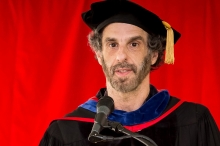Earlier this month I got an invitation to the White House.
It was rather cryptic, asking me to attend an Event, today, followed by a reception in the Indian Treaty Room
Regrettably, I had to decline, I was in Europe, and would only just be getting back. The logistics of getting to DC in time were near impossible; there is no source of funding for such jaunts; and, most important, there was no way I could get the paperwork to be cleared to attend submitted in time.
So, they went ahead without me.
The Event was the Champions of Change - Open Science edition: a Call for Nominations went out last month.
So, in a pique of proactive positiveness, I nominated Paul Ginsparg, the creator of arXiv (aka XXX) - arguably one of the single most useful tools in physics, a primary example of Open Science, and one of the earliest effective implementations of the power of the internet for communication in science.
(And he is an imaginative and effective plumber! [sorry, in-joke])
Today Paul Ginsparg was honoured at the White House as a Champion of Change, and a much deserved honour it is.
I'm sorry to miss the canapes, but at least the mystery of why the White House was sending me random invitations was revealed.
Or it was an elaborate sting operation, as suggested by an old friend...
Paul will be giving a public lecture in three weeks at the Aspen Center for Physics, and I hear he hopes to have some interesting tales from the White House, as well as the whole arXiv thing etc.
White House citation: Official Cornell Press Release
Paul Ginsparg, Ph.D.
A theoretical physicist by training, Paul Ginsparg created an open access system in 1991 for his research community to share its cutting edge results. Now called arXiv.org, and moved from Los Alamos National Laboratory to Cornell University, it serves as the primary daily information feed for global communities of researchers in physics, mathematics, computer science, and related fields. With hundreds of millions of full-text downloads/year by researchers and the general public, and ever-growing, its proof-of-concept also served as the prototype for many other modern open access systems for scientific research.


Well deserved prize!
I like your old friends idea better. :)
So when is that book about the time US government tried to kill you (and I don't mean through reduced funding) coming out?